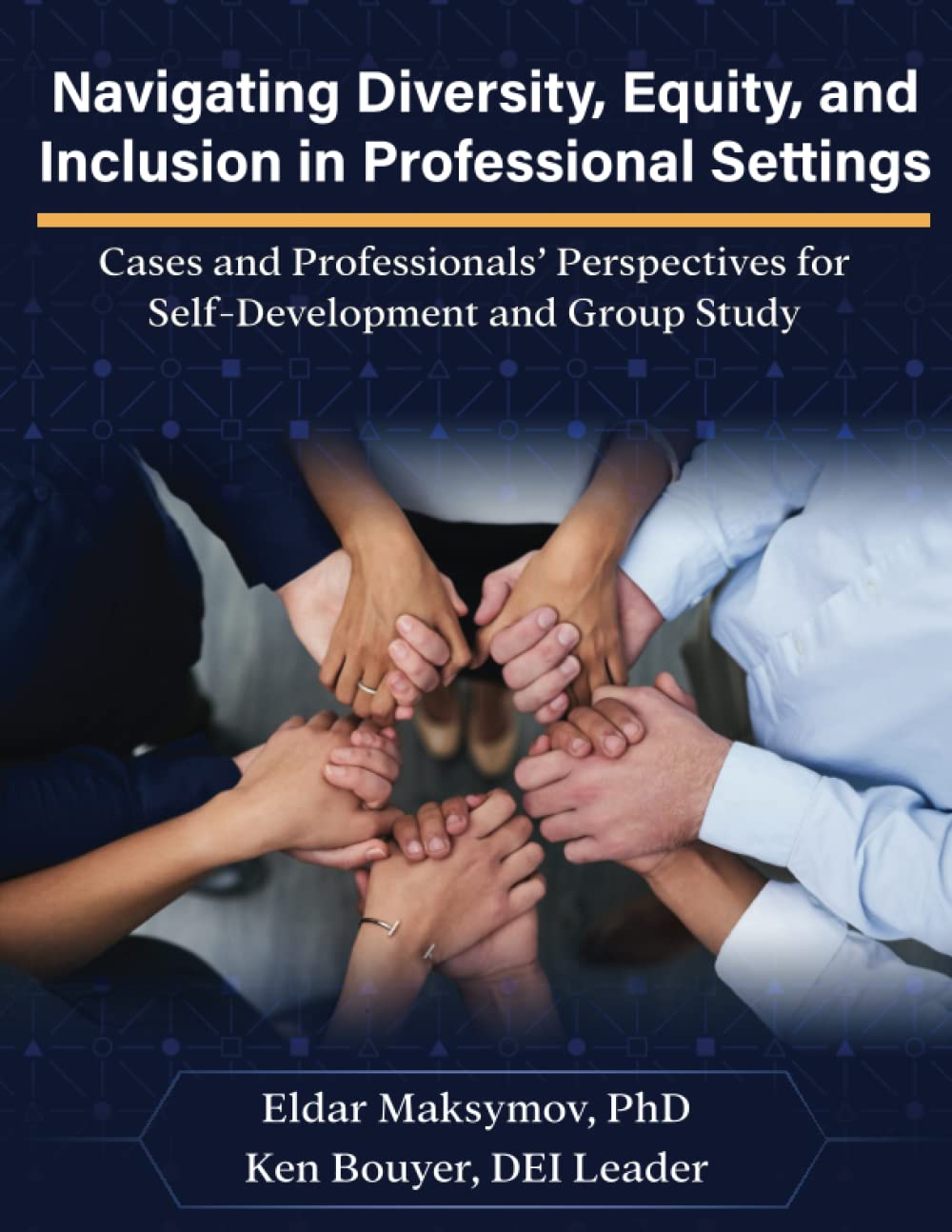Professor offers solutions to navigating diversity, equity and inclusion at work

As society progresses, hopefully, so too does the workplace.
But the topic of diversity, equity and inclusion (DEI) at work can be tricky for employees to navigate. Some may be looking for guidance on how to be part of the solution to these issues while others believe they don't exist. And a professor at ASU’s W. P. Carey School of Business who recently co-wrote a book on the subject says leaders and professionals are often left to figure it out themselves.
Eldar Maksymov, associate professor of accountancy at Arizona State University, and Ken Bouyer, director of inclusiveness recruiting at EY Americas, are the co-authors of "Navigating Diversity, Equity, and Inclusion in Professional Settings: Cases and Professionals’ Perspectives for Self-Development and Group Study."
They say their new work may sound like a textbook written for the professional world, but it’s suitable for self-study or group discussion. In fact, the two will host a book discussion and signing at 11:30 a.m. on Oct. 4 in the Avnet Lounge at McCord Hall on ASU’s Tempe campus.
Maksymov spoke to ASU News about his new book with Bouyer, their findings and how to navigate a career in harmony with DEI.
Editor's note: Answers have been edited for length and clarity.
Question: What is the premise of your new book?
Answer: It’s a book that has short case studies on particularly painful and common diversity, equity and inclusion (DEI) situations that Ken and I have observed in the professional world. Each of the 15 short cases is followed by a substantial amount of insightful perspectives from professionals who “have been there.”
For example, when a case covers how Black professionals may struggle to get promoted to leadership roles, we provide anonymous insights from Black professionals who have succeeded in being promoted to leadership roles and from those who are still struggling.
When a case covers how female professionals may struggle to receive the same legitimacy that male leaders typically receive, we include insights from successful female leaders who comment on these issues and how they are managing them.
Researching for this book opened my own eyes on many DEI issues that some groups of professionals experience, and I simply had no idea in some cases. I know that this book will do the same for many professionals, students and leaders who will read it.
Q: Why did you want to write this book?
A: Since my immigration to the United States from Ukraine in 1997, I noticed that there was a lot of racial tension and reliance on stereotypes. Europe has a lot of other problems ... but based on my European background, there was much less racial and gender-based tension than in the U.S.
As we note in our book’s description, the opinions in society on DEI range from “DEI issues do not exist” to “everything you do should be solely focused on DEI.” Of course, the truth typically tends to be somewhere in between, but I simply could not find any balanced guides on DEI issues. I have read multiple books that tend to fall either on one or the other end of the spectrum.
And while all of this unproductive arguing is going on, professionals from all backgrounds are left to navigate these issues and extreme perspectives on their own.
Q: What do you think is the big reveal or surprise of this book?
A: While writing and interviewing for this book, I came across a number of insights that were completely new to me and changed my perspective.
For example, I had no idea that female professionals tend to evaluate themselves lower and view themselves as less qualified than a male professional with similar performance would do. Moreover, it’s not because females are less confident, but it’s because of the societal norms and expectations placed on females.
One of the most helpful insights that I think leaders can use came from a professional who explained how leaders can determine when they should draw the line in accepting their employees’ different views, conduct, appearance and other characteristics these professionals embrace. ... If (a) professional’s behavior becomes a distraction to achieving (the) professional goals of the team, it is (the leader's) responsibility to help this professional understand where he may be going too far, and the professional should be open to such coaching. It’s a tricky balance of course, but to me it’s a roadmap that professionals and leaders of all backgrounds can use to help each other navigate careers in harmony with DEI principles for everyone’s benefit.
Q: Who do you see as your audience for this book?
A: Frankly, though the book’s focus is specifically on professionals, the book is for anyone who deals with people in pursuit of their goals. In particular, I would highlight leaders, professionals and students. Ken and I define professionals broadly in this sense — professionals are people who work together toward common goals using their expertise. Three categories of leaders who might find this book particularly useful are HR directors, DEI leaders at organizations and deans of business schools. Ken and I believe that every business student should receive this book as part of their welcome packet to a business school. These days, you just can’t plan to have a successful career and not understand these principles.
I’d like to note that my royalties for any ASU sales of this book will go straight back to ASU for scholarships. I think this book will benefit our students tremendously — I kept them in mind as Ken and I were writing this book.
Q: What’s your message to both organizations and professionals who read this book?
A: Readers will extract great insights from this book if they simply read it. So the book is perfectly suitable for self-study. However, the book can be also used in group discussions such as professional trainings or college classes.
I would add that for organizations that intend to use this book for group discussions such as trainings and classes, please give the instructors the support that they need, assure them that it’s OK to not know the answers, and encourage them first and foremost to focus on the message of unity. DEI principles in professional settings at their core are to help everyone have a fair chance to have the right opportunities and to succeed. DEI is not about making professionals feel bad or guilty or shaming them for not knowing someone’s culture.
DEI is about helping professionals understand each other better. It’s about giving each of your colleagues the benefit of the doubt, giving each of them a fair chance. It’s about having a relationship of trust with each colleague. And frankly, it’s like any important relationship — you just have to accept the fact that you’ll never be perfect at it, but need to keep learning and working at it, and it will keep getting better.
Q: What is the outcome or hope you have as a result of this work?
A: My hope for this book has two parts: for the book itself and for people who read the book. As far as the book itself goes — I believe Ken and I have achieved our objective. We have created a book that gives professionals, leaders and students useful insights on how to navigate DEI in professional environments based on the wisdom of Ken and numerous professionals whom we interviewed for this book.
As far as the people who read this book, Ken and I have many hopes. First, we hope that people who are well-intentioned but until now have been unsure about their abilities to navigate careers in harmony with DEI principles will now feel more confident about their abilities.
We hope people like me, who have not grown up around a lot of diversity, will have a better understanding of where professionals from diverse backgrounds come from, how they feel (and) how they want to be recognized for their expertise like everyone else, rather than stand out due to some characteristic related to their background and so forth.
And third ... I hope that eventually DEI principles will just become standard professional norm. Just like professionals used to smoke in their offices, but it’s the norm today that they do not, I hope professionals will similarly embrace DEI principles in interacting with each other and even in thinking about each other.
Top photo courtesy Pexels
More Business and entrepreneurship
The business behind the brand
Ask Jennifer Boonlorn ('01 BS in marketing) about the secret to a successful career in the luxury fashion industry and she'll tell you that community building is top of the list."I want to share…

Thunderbird at ASU ranked No. 1 in QS International Trade Rankings for third consecutive year
For the third consecutive year, Thunderbird School of Global Management at Arizona State University has been recognized as the world leader in international trade, a distinction awarded by…

'Meating' dietary needs: Study sheds light on how rising prices affect meat consumption
When prices on certain food items go up — like eggs and meat — because of the rise in plant-based diets, consumers can find an alternative.But our diets are also culturally conditioned, so for some,…
